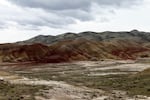Upward of a million people are expected to flood Oregon for the solar eclipse on Aug. 21, which has cities across the state scrambling to prepare. Some, like Madras, have been planning for months. Others are just beginning.
Nestled along the John Day River is one of the smallest towns in the eclipse’s path of totality: Spray. Population: 160 people, one convenience store, one gas pump and one small food counter that closes at 6 p.m.
Drop into this bucolic setting 8,000 to 12,000 visitors, the town’s estimate for the eclipse, and you have a mind-boggling ratio of about 100 tourists for every townsperson. How is that going to work?

Nearby Grant County has turned its Chamber of Commerce in John Day into an eclipse clearing house.
Aaron Scott / OPB
On a Tuesday evening, some 20 people gather in a church recreation room that doubles as a community center to try to figure it out. Wheeler County commissioner and Spray city council member Debbie Starkey leads the meeting along with her husband, Phil, the area’s superintendent.
“I want to make something perfectly clear: I take no responsibility for anything that’s going on with this eclipse,” she says to laughter around the room. “I’m really just trying to serve as a clearinghouse for information so.”
Consider Starkey Spray’s chicken little. She went to a county meeting in January and realized that nearby cities were way ahead in planning for the eclipse.
“It is coming and that's the main thing: you really don't have a choice,” she says. “You could sit there like we did for a year and think it was going to go away, but it's not.”
The meeting-goers spend several hours trying to cover all the minutiae of accommodating and catering to thousands of visitors with limited resources and a tiny working adult population. These are issues towns all along the path of totality are grappling with. The concerns range widely, from whether the town could run out of water to where the incoming hordes will park. After all, there’s only one main street in town, and no one wants their small streets lined with strangers' RVs.
“It's overwhelming,” says Spray's mayor, Daniel Allen. “Are people scared? No, we're not scared. We're just concerned that after the four days are over, what we're going to have left?”

Thousands are expected to come to Wheeler County due to its wide vistas, sunny skies and natural wonders like the nearby Painted Hills. Consequently, the U.S. Forest Service and other government agencies are struggling with many of the issues confronting small towns like Spray.
Aaron Scott / OPB
Basically, the main concerns boil down to three big questions:
How are you going to keep everyone safe in an area prone to forest fires, heat stroke, and snake bites?
As the group repeatedly points out, to cover the county's 1,715 square miles, there’s only a half-dozen deputies, four ambulances and one medical clinic (the nearest hospital is 90 minutes away — with no traffic — in the neighboring county).
Which means local volunteer EMTs and firefighters might not get much sleep. Nor likely will Allen, who doubles mayor and the town’s only physician assistant.
How are you going to house and feed all of these people when there is only one motel and one convenience store?
Like neighboring towns, Spray is looking to turn any big patch of grass — such as the school and town park — into campsites, where they hope to house anywhere from hundreds to thousands of campers.
Several ranchers are planning to turn their fields into campgrounds at hundreds of dollars per site for the weekend. Some are gearing up to offer water hookups, food and even entertainment — full weekend mini-festivals — while others will just provide space for toilets and to pitch a tent.
Related: Madras, A Little Farming Town, Sees Big Opportunity In Solar Eclipse
"We're planning up to 375 campsites," Frank Asher chimes from the back of the group as the Starkeys try to add up how many people the town can handle. Asher's plans are by far the biggest in the county: accommodating potentially 3,000 campers (the maximum occupancy under the county permit), although he's offering the barest of necessities: space, bathrooms, and access to the river and hiking.
In tandem, local groups are debating cookouts to feed all the campers. The school is thinking of hosting a bake sale; the local grange is considering a biscuits and gravy breakfast; others are considering breakfast burritos or cowboy breakfasts.
“Nobody’s really talked about something like a potato bar, a spaghetti feed or anything for lunch, so those things are sort of open,” says Debbie Starkey as she runs through the list, writing everything on a giant pad of paper at the front of the group.
Some, like Asher, see big economic potential. “We just decided that we would step up to the plate and try to get some folks to come to Spray,” he says. “Maybe give our economy a little shot in the arm, because we definitely need it.” The hope is visitors would love the area so much they would come back again.

A number of small-town entrepreneurs have already started producing eclipse-themed souvenirs, like the pop-up shop Grumpy's Eclipse Central in Prairie City, whose tagline is "Fine art and not so fine art."
Aaron Scott / OPB
To attract visitors,
, like
, created a webpage with links to all the camping, housing and food options local people are offering, in addition to existing restaurants and gas stations.
But the economic opportunity comes with a big gamble: No one knows how many people are coming, so it’s risky for a low-income region to stock up on food, ice, and help and have it go to waste.
Speaking of waste, there’s one final planning question people keep returning to:
"Let me just talk about the port-a-potties, because that was my big thing," Starkey interjects later, again to a round of laughter. She tells everyone that Spray is spending $13,000 to rent 94 port-a-potties for the area. Like many neighboring towns and agencies, the eclipse is resulting in an outlay of money that many don't have, with little guarantee that they'll recoup the costs (Starkey has even started a GoFundMe campaign to help the town cover the port-a-potties).
“Who would ever think you're going to spend so much time talking about port-a-potties,” she says. “But, you know what, it is a big issue. You’re going to have people just squatting on the side of the street, you know.”
What everyone worries about is that visitors don’t realize this is frontier country. Basic things like food, gas, cell service, and water are going to be in short supply, so like the people of Spray, visitors are going to need to plan ahead.
